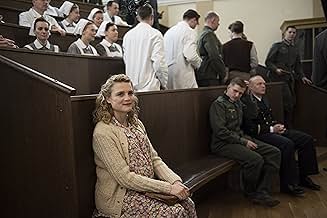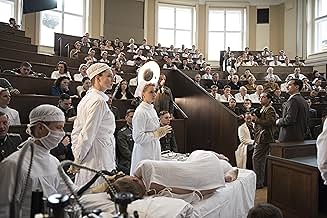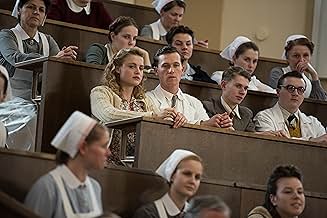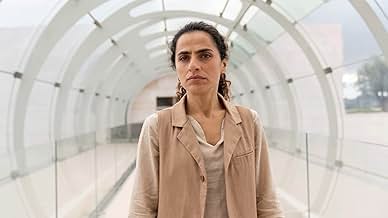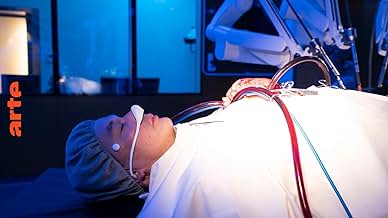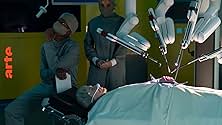AVALIAÇÃO DA IMDb
7,8/10
4 mil
SUA AVALIAÇÃO
Descreve as realizações de vários médicos e cientistas alemães famosos no prestigioso Hospital Charité em Berlim durante a sua história.Descreve as realizações de vários médicos e cientistas alemães famosos no prestigioso Hospital Charité em Berlim durante a sua história.Descreve as realizações de vários médicos e cientistas alemães famosos no prestigioso Hospital Charité em Berlim durante a sua história.
- Prêmios
- 3 vitórias e 9 indicações no total
Explorar episódios
Avaliações em destaque
"Charite at War" covers the German hospital during World War II.
The film focuses on Anni (Mala Emde), her doctor husband Arthur (Artjom Gilz), the brilliant surgeon Sauerbruch, and Anni's brother (Otto Jannik Schumann), an in-the-closet gay. Given Rule 175, homosexuals who were caught were arrested and worse.
The group at the hospital reflects the differing views of citizens under Hitler's restrictions, some of whom display delusional thinking. Artur works with disabled children who are wards of the state as he works to develop a new vaccine. These children are eventually sent to another hospital, where Artur believes the children receive treatment, though the truth is, they are exterminated.
Sauerbruch goes along with Hitler's restrictions, but he believes he has a duty to all patients, and that includes Jews. He himself spoke to the Minister of Justice to end the extermination of children - and believes it is no longer happening.
Anni is a would-be doctor studying with Sauerbruch. Anni is comfortable that she and Artur have the correct genes. However, their new baby, Karin, possibly has hydrocephalus. This means she has to be reported and transferred, and that they may be sterilized. Instead, they treat the baby at home and then appeal to Sauerbruch for help. She and Artur face a crisis in their beliefs and in their marriage.
Otto falls in love with a male attendant at the hospital. There is a young nurse after him, who presses him for a commitment before he leaves for the service. When she doesn't get it, trouble ensues.
A cruel doctor accuses soldiers in the infirmary of faking their illness or wounded themselves, and they are sent for execution.
Meanwhile Germany is losing the war, and everyone hopes it will be over soon. Nobody seems to like Hitler. Sauerbruch thinks he's crazy. But they all live with terror.
Toward the end of the film, we see what Hitler sent out to fight - teenage boys. Pathetic.
An interesting cross-section of those who are secret spies and just plain keeping secrets as they try to get through their lives and survive Hitler.
"Charite at War" is depressing, and we see how the German people suffered. Toward the end of the war, there was no water, no supplies at the hospital, nothing, as doctors use liquor to sterilize their hands and anesthetize the patients.
And that's what happens when someone tells you that some people are superior to others, and anything that goes wrong with the country is the fault of these lesser people.
I'd say never forget, but it seems as though we have.
The film focuses on Anni (Mala Emde), her doctor husband Arthur (Artjom Gilz), the brilliant surgeon Sauerbruch, and Anni's brother (Otto Jannik Schumann), an in-the-closet gay. Given Rule 175, homosexuals who were caught were arrested and worse.
The group at the hospital reflects the differing views of citizens under Hitler's restrictions, some of whom display delusional thinking. Artur works with disabled children who are wards of the state as he works to develop a new vaccine. These children are eventually sent to another hospital, where Artur believes the children receive treatment, though the truth is, they are exterminated.
Sauerbruch goes along with Hitler's restrictions, but he believes he has a duty to all patients, and that includes Jews. He himself spoke to the Minister of Justice to end the extermination of children - and believes it is no longer happening.
Anni is a would-be doctor studying with Sauerbruch. Anni is comfortable that she and Artur have the correct genes. However, their new baby, Karin, possibly has hydrocephalus. This means she has to be reported and transferred, and that they may be sterilized. Instead, they treat the baby at home and then appeal to Sauerbruch for help. She and Artur face a crisis in their beliefs and in their marriage.
Otto falls in love with a male attendant at the hospital. There is a young nurse after him, who presses him for a commitment before he leaves for the service. When she doesn't get it, trouble ensues.
A cruel doctor accuses soldiers in the infirmary of faking their illness or wounded themselves, and they are sent for execution.
Meanwhile Germany is losing the war, and everyone hopes it will be over soon. Nobody seems to like Hitler. Sauerbruch thinks he's crazy. But they all live with terror.
Toward the end of the film, we see what Hitler sent out to fight - teenage boys. Pathetic.
An interesting cross-section of those who are secret spies and just plain keeping secrets as they try to get through their lives and survive Hitler.
"Charite at War" is depressing, and we see how the German people suffered. Toward the end of the war, there was no water, no supplies at the hospital, nothing, as doctors use liquor to sterilize their hands and anesthetize the patients.
And that's what happens when someone tells you that some people are superior to others, and anything that goes wrong with the country is the fault of these lesser people.
I'd say never forget, but it seems as though we have.
A very good show.
I liked the telling of the beginnings of modern bacteriology. I had Google on the ready, to look up every new name which appeared - they were people who had a huge impact on our world. They are shown with all their faults and failings, as well as their successes.
I was sceptical about the introduction of Arthur Conan Doyle (creator of Sherlock Holmes), which I thought was just a dramatic device, but Google showed it to be factual, and what followed on was also based on fact.
An extremely interesting, and educational (in the good sense of the word) series.
I liked the telling of the beginnings of modern bacteriology. I had Google on the ready, to look up every new name which appeared - they were people who had a huge impact on our world. They are shown with all their faults and failings, as well as their successes.
I was sceptical about the introduction of Arthur Conan Doyle (creator of Sherlock Holmes), which I thought was just a dramatic device, but Google showed it to be factual, and what followed on was also based on fact.
An extremely interesting, and educational (in the good sense of the word) series.
The thing I found most fascinating about this series is the way normal people survive under fascist rule. The duality of being healers and having to follow the terrible laws of the Nazi regime come very much into play.
The production quality is superb. It is provocative and we'll worth watching.
But the task is well executed. While there is some telescoping of historical events, I have a degree in history and the story line I found to be artistically effective. Acting, pacing and production values exceed expectations. And to disagree with one reviewer, the Russians were barbaric in their ending of the war. If anything, that was downplayed.
8B24
On first viewing the promos for this series, I was determined not to watch it, fearing that...like so many German films in recent past...it would be filled with sensationalist and graphic wartime atrocities. When at the urging of a colleague I did give it a chance, I was pleasantly rewarded by its technical brilliance and occasional emotional depth. The medical scenes are nowhere as good as those of British or American hospital soaps, but they are in any case subordinate to a riveting drama framed by actual historical data from World War 2. The main characters are in fact based on real people, and the events more or less accurately in harmony with contemporary events.
As usual, subtitles are inferior to dubbing. Simultaneous verbal and visual effects are needed to avoid losing a great deal of dramatic impact. Many subtle or ironic phrases in German go flying right past translation, especially in a rapid fire interchange like many in this story.
Another minor fault is that, as in many fictional accounts of the war, too many small gratuitous references and characters from history keep popping up to impede the main narrative. But that in no way diminishes the central theme of ordinary people, non-combatants, coping with the traumatic impact of atrocities occurring all around them.
Are there other lessons to be learned from witnessing a sympathetic and righteous population taken over by a cult leader in challenging times? I think so.
Você sabia?
- CuriosidadesSeason 3 takes place in Berlin, summer 1961.
- ConexõesReferenced in Riverboat - Die MDR-Talkshow aus Leipzig: Folge vom 15. Februar 2019 (2019)
Principais escolhas
Faça login para avaliar e ver a lista de recomendações personalizadas
- How many seasons does Charité have?Fornecido pela Alexa
Detalhes
- Data de lançamento
- País de origem
- Central de atendimento oficial
- Idioma
- Também conhecido como
- Charité at War
- Locações de filme
- Empresas de produção
- Consulte mais créditos da empresa na IMDbPro
Contribua para esta página
Sugerir uma alteração ou adicionar conteúdo ausente


![Assistir a Trailer Staffel 2 [OV]](https://m.media-amazon.com/images/M/MV5BNWU0YWE0YjMtNDZjYy00ODk3LWE1NWItMjkwOTE0NTA5MDA4XkEyXkFqcGdeQXRyYW5zY29kZS13b3JrZmxvdw@@._V1_QL75_UX500_CR0)
